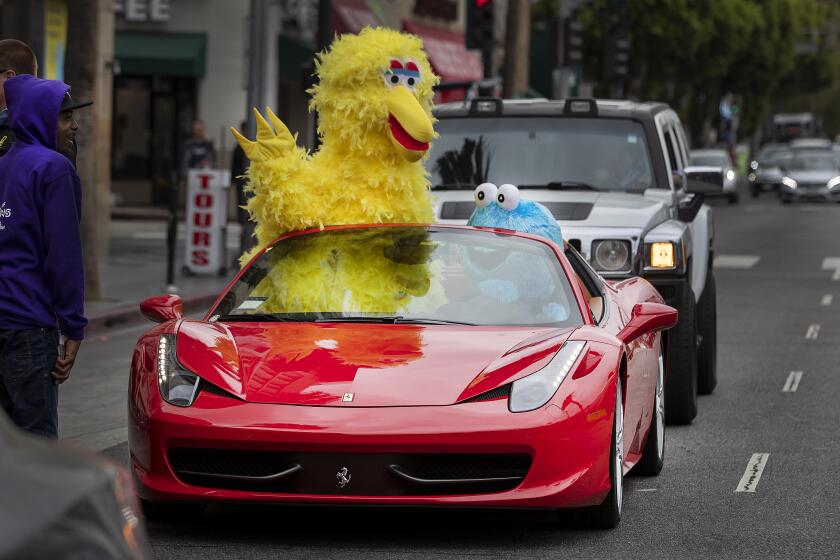The Hollywood writers’ strike is over. Why was it so hard to get a deal done?

Welcome to the Wide Shot, a newsletter about the business of entertainment. Sign up here to get it in your inbox.
There’s a nagging question for Hollywood that lingers beyond Sunday night’s celebratory mood following the tentative deal to end the writers’ strike.
Did this really have to take 146 days?
Nearly five months of marching and chanting on picket lines. Week after week of entertainment industry workers wondering when they’d see their next paycheck, whether they’d keep their homes and how their families could cope without healthcare coverage.
Empty soundstages. Dormant prop houses. At least the financial assistance nonprofits were kept busy.
Yes, the studios boosted their free cash flow numbers as the film and TV production economy went quiet. But, generally speaking, studios recognized that they couldn’t long sustain a business in which they couldn’t make and promote movies and TV shows.
Now, finally, as of Sunday night, the Writers Guild of America and the studio alliance have reached a long-awaited agreement on a new three-year film and TV contract. Time to pick up the pieces after a disruptive work stoppage.
But the strike is not quite over yet, nor is the film and TV business set to come roaring back to full health right away.
The WGA negotiating committee said in its message to its 11,500 members that it would vote to send the deal to the WGA West board and WGA East council for approval (likely Tuesday), followed by the scheduling of a ratification vote by the guild’s membership. Writers won’t go back to work until authorized by their union.
With actors still on strike, most scripted productions can’t get back up and running immediately, though late-night shows and talk programs should be operating soon.
Thus all eyes will soon turn to SAG-AFTRA.
The 160,000-member performers’ guild’s demands and sticking points are broadly similar to those of the writers (better pay for streaming, data transparency and so on). Scribes, while declaring victory for themselves, have posted messages of solidarity for the actors, and it’s not clear when SAG-AFTRA and the Alliance of Motion Picture and Television Producers, which represents the major studios, will return to negotiations.
But there will be ample pressure to move things along now that the writers’ strike is effectively resolved.
Specific WGA deal points have yet to be disclosed, and won’t be until the lawyers finish combing through the fine print. We’ve yet to see how, exactly, the sides dealt with the stickiest issues, including minimum staffing in writers rooms, success-based financial rewards for streaming series and the threat of artificial intelligence, on top of the typical stuff like increases in wages and residuals.
The AI debate has proved to be especially challenging, as the technology is developing rapidly and neither side wants to incorporate language into a contract that would backfire three years from now. AI could be an even bigger sticking point in dealing with the actors, for whom advancements in generative image and voice tech could represent a more tangible and immediate threat.
All of these are issues that writers considered not just essential but existential. To many, this fight wasn’t only about improving their own livelihoods, but also about preserving screenwriting as a viable career option for future generations.
Screenwriters portrayed it as a fight for the survival of their profession, adopting the apocalyptic rhetoric of a high-stakes presidential election.
Studio chiefs, early on, made one tone-deaf public relations blunder after another, with one executive, allegedly and anonymously, telling Deadline they wanted to starve out the writers. Walt Disney Co. Chief Executive Bob Iger, speaking from the billionaire summer camp of Sun Valley, Idaho, seemed to provoke scribes and actors by saying that their demands were simply “not realistic.”
As SAG-AFTRA joined the writers in July, a rousing speech by the actors union’s president, Fran Drescher, injected a dose of adrenaline into the nation’s “hot labor summer.” After more weeks of picketing, an August restart of negotiations between the WGA and the studios ended in disaster.
By late last month, mistrust between and frustration had soared off the charts.
The studios, believing that they were being forced to negotiate against themselves, released a summary of their Aug. 11 proposal in an effort to show that they had been willing to bend on key fronts. Writers — buoyed by high levels of solidarity from within and from fellow unions — were enraged, seeing the tactic as a blatant attempt to go around their negotiating committee.
At last, after additional dueling press releases, discussions picked up last week with a new sense of urgency as the CEOs joined the proceedings at the AMPTP’s Sherman Oaks headquarters. If the shutdown lasted much longer, there’d be little hope left of salvaging the 2023-2024 television season. Movie slates would be further disrupted.
In the absence of a Lew Wasserman-type figure, the task of leading the studios through the impasse was taken up by a Gang of Four: Iger, Netflix co-CEO Ted Sarandos, NBCUniversal studio group chairman Donna Langley and Warner Bros. Discovery chief David Zaslav. The same quartet took part in the fateful Aug. 22 meeting that guild negotiators described as a “lecture.”
The fractious tenor flared up again over the weekend, even as it seemed as if a deal was in progress, if not imminent.
The AMPTP on Saturday presented its “best and final” offer, as people close to the studios described it, leading to a social media freakout as the most vocal writers on X (formerly Twitter) took issue with what looked like a take-it-or-leave-it stance from the suits. But the uproar did not, in fact, torpedo the deal as some feared it might.
Calling an offer “best and final” is not particularly unusual in a negotiation, though WGA Resistance Twitter took full advantage of the opportunity to dunk on the companies’ used-car salesman lingo. As many a professional pontificator has learned throughout this process, writers sure know how to land a brutal insult.
In the end, as was always going to be the case, the two sides had no option other than to work with each other. They had it wrapped up in a matter of days (though not in one or two days, despite the suggestions of a premature report).
As the anxieties boiled over online, the negotiators themselves pushed forward. This was never a situation in which the writers had to agree to a truce by Yom Kippur or be left to picket until January or beyond. There’s a lot of work to do. But count this as one Hollywood Armageddon avoided for now.
More strike coverage:
- Hollywood assistants aren’t in the guild. They’re still hit hard by the strike
- What are residuals and how do they work? A Hollywood strike battleground, explained
- Striking Black writers fear a contraction is coming
- Hollywood crew members fight to hang on as the strikes drag on: ‘We’re the collateral damage’
Stuff we wrote

— Investigations into secret payments. A new sports colossus. Inside Vince McMahon’s last stand. Throughout his controversial career, McMahon has faced odds and weathered various scandals while building the world’s largest professional wrestling operation.
— Rupert Murdoch, the powerful and polarizing media mogul, steps down as chairman of Fox. Murdoch will be chairman emeritus of Fox Corp. and News Corp., while his son Lachlan will become the sole chairman in charge of the companies.
Related:
- Real-life ‘Succession’ as Lachlan Murdoch solidifies perch atop Fox and News Corp.
- Lorraine Ali’s take: Outrage fueled the ascension of Murdoch’s TV empire — a boon for entertainment but not news.
- Michael Hiltzik: Murdoch’s malign influence isn’t going anywhere.
— Why would Disney want to sell ABC? The storied television network and its stations have been part of Disney for 27 years. But the company’s streaming ambitions may put the unit on the block.
— ICYMI. U.K. regulator signals approval for Microsoft to buy Activision Blizzard. Streaming service Max to launch live sports Bleacher Report add-on next month. Amazon’s Prime Video to incorporate commercials next year. WWE’s ‘Smackdown’ is jumping to NBCUniversal’s USA Network from Fox.
Best of the web
— The Guardian looks into calls to remove former President Trump’s star on the Hollywood Walk of Fame and the complications that come with that idea.
— Jann Wenner’s biographer, writing in Vanity Fair: “He revealed the ugly truth of Rolling Stone,” referring to Wenner’s ludicrous comments about Black and female musicians.
— This great interview with Martin Scorsese is getting a lot of attention, mostly for the director’s comments on French New Wave cinema. Just kidding; it’s the comic book movie stuff, again. (GQ)
— Podcast: Kara Swisher grills Walter Isaacson about his new Elon Musk biography, making much use of a critical column by the Times’ Brian Merchant, which argues for an end to the “great man” nonfiction book subgenre.
The conversation presents warring ideas about how a biography ought to treat its subject, with Swisher pressing Isaacson to state his for-or-against position on Musk. Isaacson refuses, saying his goal is to present a narrative of an important and flawed individual and leave the moral judgments to the reader.
Finally ...
I’ve been a big fan of Savannah, Ga.-based sludge-rock band Baroness. The group’s latest album “Stone” features all of the band’s signature heavy metal and punk influences, with a little more of the prog leanings that were hinted at on previous albums. Here’s “Last Word,” a song that showcases some of the rockers’ weirder tendencies along with their usual heavy riffage.




